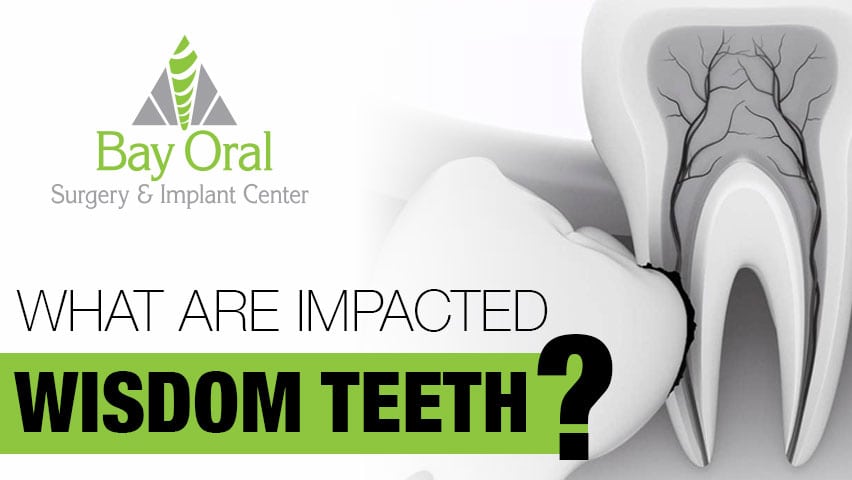
by Bay Oral Surgery | Sep 15, 2018 | Blog, Wisdom Teeth

Impacted teeth is a term used to describe when a tooth doesn’t come in or only emerges partially. This can happen for a number of reasons, but most commonly happens with your third molars or wisdom teeth. Your jaw might be too small, or overcrowded with no room for new teeth to break out. Teeth can also become tilted, twisted or disturbed as they attempt to emerge.
Symptoms of Impacted Teeth
Most cases of impacted teeth can be recognized by x-rays during regular dental visits before they ever even become a problem.
Other symptoms of tooth impaction include:
- Swelling gums in the back of your mouth
- Bleeding gums
- Difficulty and pain opening your jaw
- Bad breath and bad taste in your mouth
- Painful chewing and biting
- Headaches
- Swollen neck and shoulder glands
Are you experiencing the painful symptoms of wisdom tooth impaction? Check out our previous article on home remedies for treating wisdom tooth pain.
Types of Impacted Teeth
There are four types of impacted teeth that include horizontal impaction, vertical impaction, angular impaction, and partial eruption.

Horizontal Impaction is the most painful type of impaction as the tooth or teeth grow in sideways, fully beneath the gums. The tooth will move and grow horizontally, as the name implies, pushing forward on the molar in front of it. This type of impaction is diagnosed with x-ray and will likely cause damage to surrounding teeth and unbearable pain if it isn’t taken out. This extraction should be done under IV sedation or general anesthesia.
Vertical Impaction happens when the tooth is growing and erupting vertically but may be too close and rubbing against or pushing, from beneath, the molar next to it. It’s very likely that this type of impaction will erupt normally and most cases don’t require surgery to remove them.
Angular Impaction can happen one of two ways. Distal Impaction happens when the tooth is angled towards the back of the mouth. This is the most uncommon type of tooth impaction and is left up to the dentist or surgeon to determine whether it needs to be removed. That decision is mostly based on the angle and whether the tooth will eventually grow to impact the jaw bone.
Mesial Impaction is the opposite of Distal both that the tooth angles forward towards the front of the mouth, and that it is the most common type of tooth impactions. Mesial Impaction commonly accounts for Partial Eruptions as the back of the tooth erupts and the front is pressed against the anterior molar. This will typically be monitored to determine if extraction is necessary.
While all impacted teeth can cause discomfort, not all types of teeth impactions require immediate surgery. We recommend that you don’t wait until the pain becomes so intense that immediate emergency surgery is the only option. Schedule your appointment today with the experienced and knowledgeable surgeons at Bay Oral Surgery & Implant Center.
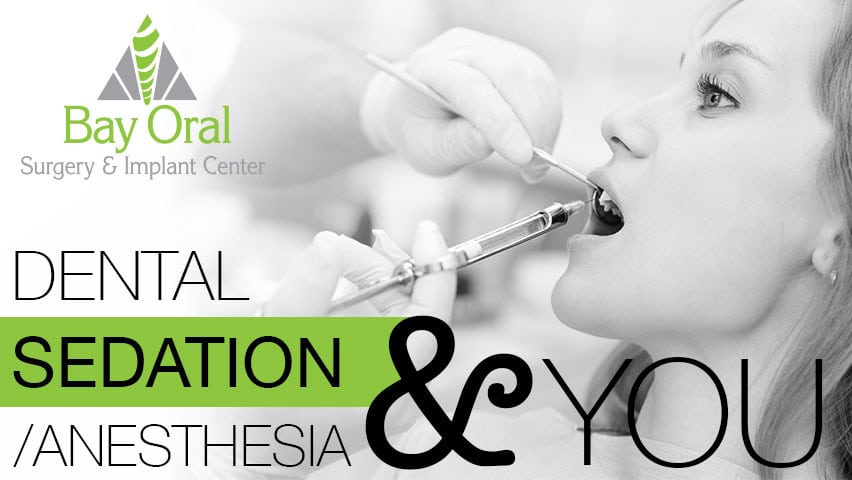
by Bay Oral Surgery | Aug 10, 2018 | Blog, Implants, Wisdom Teeth

There are three main types of sedation used in oral surgery; local anesthetic, IV sedation, and general anesthesia. It’s important to remember, with Bay Oral Surgery & Implant Center – all of our services are surgical in nature and will require some type of anesthesia, for that reason we think it’s important that you understand the different types of anesthesia commonly used in oral surgery. What they are, what they do and what type of dental anesthesia is right for your procedure.
Local
A local anesthetic is typically what you will find at your dentist office, having a tooth removed or having a cavity filled. It’s an injected drug that will temporarily numb a small area. While you will remain awake and aware during the procedure this type of anesthesia blocks the communication of your nerves to pain receptors in your brain, making you much more comfortable during a procedure.
Intravenous (IV) sedation
IV sedation is, as the name implies, typically taken through a vein. It works quickly to promote a sleep like state. Unlike General Anesthesia, you are still conscious with IV sedation and able to respond to visual signals. However, when you “wake up” after the procedure you will not remember any of it and will be quite groggy. Because of this, we require all patients to secure a safe ride home after any surgery and don’t recommend driving for at least 24 hours. IV sedation does not control pain so you can expect it to be used in combination with a local anesthetic.
General Anesthesia
General anesthesia uses a combination of IV and inhaled gasses to make a patient completely unconscious during a procedure in the hospital setting. Patients are unable to respond or feel any pain. This type of anesthesia is absolutely necessary for complex and traumatic dental surgeries, such as facial fractures, and is only administered in the hospital setting by an anesthesiologist.
Check out this page on our website for what to do and what not to do when preparing for sedation at Bay Oral Surgery & Implant Center. https://bayoralsurgery.com/sedation/ Contact us, if you have any questions or concerns about the sedation you will be receiving or the pre-op instructions.
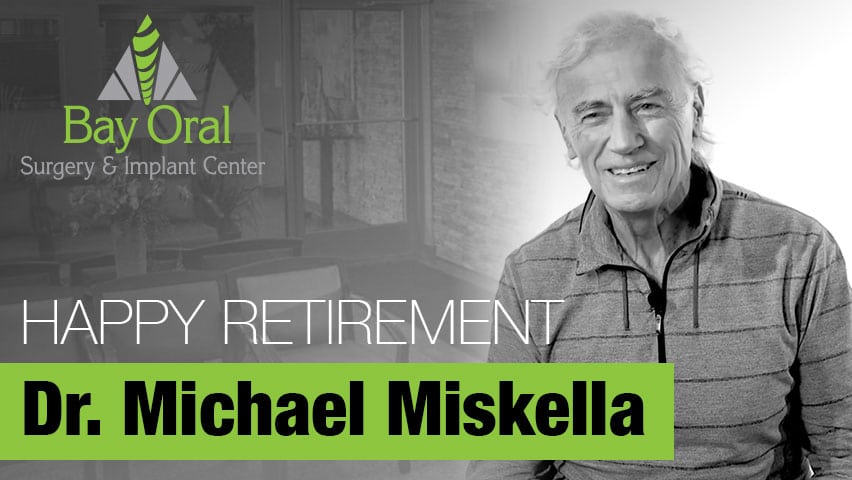
by Bay Oral Surgery | Jul 15, 2018 | Blog

Dr. Miskella founded Bay Oral Surgery & Implant Center (formerly Bay Oral & Maxillofacial Surgery) in 1974, when he returned to Green Bay, his hometown, after his internship and residency at Johns Hopkins Hospital. After 44 years serving Green Bay and the surrounding areas, building relationships, and having the opportunity to treat multiple generations, Dr. Michael Miskella is retiring.
Dr. Miskella began his career in dentistry in 1969. In his years serving the Green Bay and surrounding areas, he’s been a proud member of Wisconsin Dental Association, Wisconsin Society of Oral & Maxillofacial Surgeons, American Dental Association, American Association of Oral & Maxillofacial Surgeons, St. Vincent Hospital’s Physicians Health Committee, and St. Mary’s Hospital Board and Medical Leadership Program.
Dr. Miskella has been married to his wife since 1972, and they have four grown children and four grandchildren together. Dr. Miskella enjoys tennis, cycling, and golf in his free time.
We wish the best of luck to you Dr. Miskella. From all of us at Bay Oral Surgery, we thank you for founding and growing this practice, and we are honored to continue carrying on your vision and commitment. Enjoy your retirement!
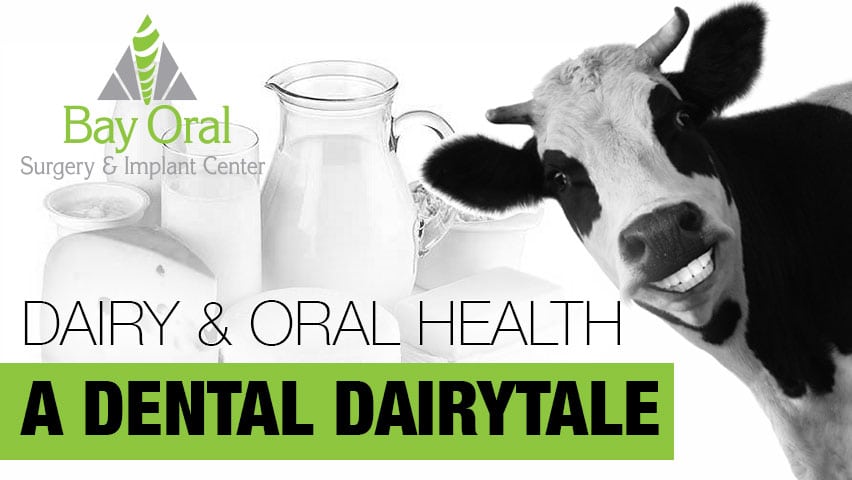
by Bay Oral Surgery | Jun 15, 2018 | Blog
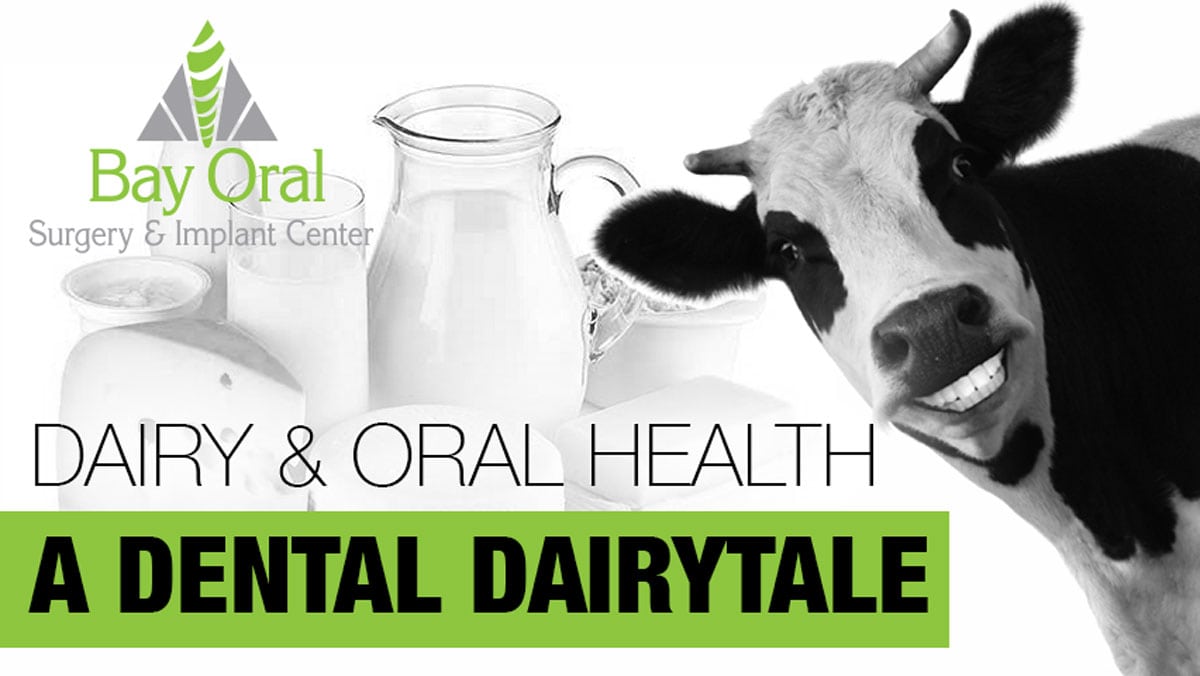
It’s dairy month! Here in Wisconsin, you certainly don’t need to be reminded of that. But we thought we would remind you of how dairy can promote oral health and prevent the risk of tooth decay and dental disease. We have the facts about your favorite dairy products and how they love your teeth.
 Cheese can protect you from cavities. (source)
Cheese can protect you from cavities. (source)
A study done in 2013 and published in the peer-reviewed clinical journal of the Academy of General Dentistry (AGD), found that of three types of dairy products consumed, milk, cheese, and yogurt, cheese showed a rapid increase in pH levels in the mouth. Why is this important?
The authors determined that a pH level at or below 5.5 puts you at a higher risk of tooth erosion. Tooth erosion happens when acids wear away the protective enamel on your teeth. As we know, tooth erosion is irreversible and without our protective enamel, often leads to tooth decay, or as we commonly call it, cavities.
AGD spokesperson, Seung-Hee Rhee, DDS, FAGD had this to say: “It looks like dairy does the mouth good. Not only are dairy products a healthy alternative to carb- or sugar-filled snacks, they also may be considered as a preventive measure against cavities.”
 Milk can keep your teeth strong. (source)
Milk can keep your teeth strong. (source)
There’s been some debate in recent years about the true benefits of milk on bones and teeth. We have known for years that milk is an excellent source of calcium and vitamin D. Calcium is a crucial element in strengthening your enamel and protecting your teeth from cavities. Some discussion has considered whether milk can actually draw calcium away from your teeth rather than replenish and restore.
What is important to know about milk, and calcium in general, is that to properly absorb calcium, your body needs to have a sufficient supply of vitamin D. Calcium alone is not enough. And while both calcium and vitamin D can be found in other foods, not all foods contain both the way milk does.
What’s more? Milk has been found to be more effective than fruit juice or water at neutralizing acids in your mouth after eating sugary foods. The same acids that wear away your enamel. Double duty!
 Yogurt can decrease gingivitis and plaque.(source)
Yogurt can decrease gingivitis and plaque.(source)
Just like milk and cheese, yogurt is high in calcium, protecting your teeth’s enamel. But yogurt is also a great source of probiotics. You know, the good healthy gut bacteria that keeps your digestive system healthy and boosts your immune system. Well, that’s not all. The probiotics found in yogurt help to keep your mouth healthy by eliminating bad bacteria (called salivary mutans streptococci) in the mouth. And when the bad bacteria goes, gingivitis and plaque go with it.
Of course, we are talking about sugar-free yogurt. In addition to the natural lactose, lots of yogurts are loaded with added sugar – and you know how we feel about sugar!
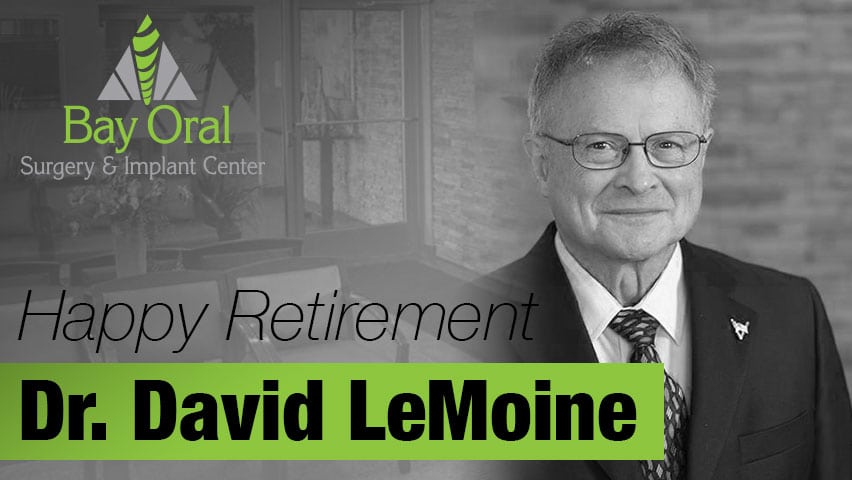
by Bay Oral Surgery | May 14, 2018 | Blog

After 38 years we say goodbye to Dr. David L LeMoine as he embarks on a new adventure of retirement! Serving the Green Bay community has been his passion and his life’s work but is now looking forward to relaxing and spending time with his wife, their three children, and eight grandchildren.
Dr. LeMoine began his career in dentistry in 1977. In 1980 he joined Dr. Miskella in Green Bay, WI at Bay Oral & Maxillofacial Surgery, now known as Bay Oral Surgery & Implant Center.
He’s been a proud member of the American Board of Oral & Maxillofacial Surgery, American Association of Oral & Maxillofacial Surgeons, American Dental Association, Wisconsin Dental Association, The Wisconsin Society of Oral & Maxillofacial Surgeons and Brown, Door, Kewaunee Dental Society.
A joyful retirement celebration was held on May 11th at Lambeau Field Atrium, where many of Dr. LeMoine’s family, friends and colleagues were in attendance. The private event featured a dinner, video presentation of those who have worked with Dr. LeMoine for many years – sharing stories about their time together and well wishes for the future, also live music and a speech from Dr. LeMoine himself.
Best of luck to you Dr. LeMoine, thanks for all of your years of dedication to Bay Oral Surgery. Good luck, good health and happy retirement!
Memories from Dr. LeMoine’s Retirement party on May 11, 2018.







 Cheese can protect you from cavities. (
Cheese can protect you from cavities. ( Milk can keep your teeth strong. (
Milk can keep your teeth strong. ( Yogurt can decrease gingivitis and plaque.(
Yogurt can decrease gingivitis and plaque.(